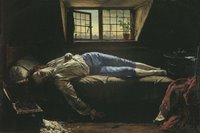 The boddynge flourettes bloshes atte the lyghte;
The boddynge flourettes bloshes atte the lyghte;
The mees be sprenged wyth the yellowe hue;
Ynn daiseyd mantels ys the mountayne dyghte;
The nesh yonge coweslepe bendethe wyth the dewe;
The trees enlefed, yntoe Heavenne straughte,
Whenn gentle wyndes doe blowe to whestlyng dynne ys broughte.
Thomas Chatterton, the anguished teenage poet, was one of the great fakers of the Romantic period–his short-lived and unsuccessful career, which started with him faking medieval poetry, ended with his suicide in an attic at the tender age of eighteen.
And plagiarization is something fiction writers are too often accused of…after all, all regencies are about fresh-faced ingenues and rakes, right?…aren’t they? Even though academic story analyses have proposed that all story-telling is derivative, and derive from a handful of basic plots, it’s something we are accused of far too often.
As a living example of how different writers can take a simple plot premise and work it into something different, visit Diana Peterfreund’s Great Blog Voice Experiment. Diana invited twelve writers for their contribution, and each is different and interesting. Why? It’s a question of individual imagination and individual voice–whatever voice is. It’s one of those difficult-to-define elements that distinguishes a writer’s work, and I hold the theory that the stronger the voice, the more extreme the reader’s reaction.
Can you define voice? Which writers have a strong voice, and what do you like/dislike about their work?
Janet

Ah, Chatterton! Was ever so bad a poet so well known as he? Love that painting though.
Voice is something that is hard for me to define, but I know it when I see it. Some of the stronger voices I can think of are: Eloisa James, Jo Beverley, Carla Kelley, Judith Ivory, Connie Brockway…
When I think strong voice, I tend to first think of authors who write funny. (Is it because humor is so idiosyncratic? Or because comic novelists tend to be stylists???) Certainly Barbara Metzger, Nonnie St. George, and Joan Smith come to mind right away. And I’m sure I’ll think of more in a minute!
Cara
I have trouble defining “voice” too. It’s more than stylistic issues, because sometimes authors who write several different genres/styles still have a recognizable voice.
So maybe it’s part style and part the author’s way of looking at the world. I think it’s that issue–the world view–that can be polarizing.
There’s a lot of poetry to Julia Ross’s writing. Beauty is important to her, I think. Loretta Chase has a unique voice in that she often approaches angst through humor.
Elena
“Voice” is so hard to discern for me, which is bad since I’m a writer myself. 🙂 I just “know” when I like someone and respond to their style. There are certain authors who are very distinctive, like Laura Kinsale, Eloisa James, Julia Ross, Liz Carlyle…
Well, she’s not a Regency writer, but for me the author that leaps to mind when you say “strong voice” is Jennifer Crusie. There is something about her style of humor and characterization that is immediately recognizable.
Among Regency writers…Carla Kelly and Barbara Metzger both immediately stand out in my mind. Though two more dissimilar writers would be difficult to imagine. 🙂
Todd-who-seems-to-be-losing-his-voice